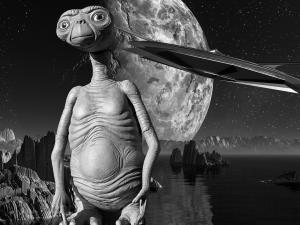
Every so often, there will be a report in the news indicating the openness the Catholic Church has for the existence of aliens. From stories about Br. Guy Consolmagno, who runs the Vatican Observatory in Arizona, making it clear that the church is interested in the possibility of alien life, to Pope Francis indicating he would baptize an alien if an alien came to him and asked for it, it sometimes appears that the Catholic Church not only has embraced the possibility of the existence of alien life, it is actively searching for it. Indeed, the Vatican Observatory has been known to have conferences concerning the question of alien life, showing how seriously the Catholic Church takes the issue. But, is the Catholic Church really going alien hunting?
The answer is both yes and no. Yes, because there are many in the church who are interested in the question of alien life. No, in the sense that the church does not think it is a central concern, nor that everyone needs to be interested or engage it for themselves. Nonetheless, the Catholic Church is vast, and it desires to encourage and promote scientific research. It knows that through science, we get a better understanding of creation, and a better understanding of creation will give us better insight into God. For creation reveals the glory of God. “Ever since the creation of the world his invisible nature, namely, his eternal power and deity, has been clearly perceived in the things that have been made” (Rom. 1:20a RSV). The heavens themselves, that is the sky and what is in them, are said to present the glory of God. “The heavens are telling the glory of God; and the firmament proclaims his handiwork” (Ps. 19:1 RSV). If aliens exist somewhere else in the universe, that certainly would explain how the heavens could tell of the glory of God, for through them, we could then find many others who could have their own unique relationships with God, relationships which could tell us more of God’s greatness if we ever come to know them.
Those interested in the pursuit of science, in cosmology, in exploring what we know of the universe and what might or might not be in it, represent a calling that the church recognizes, but it does not expect it from everyone. The question about alien life is one speculative issue which many Christians, theologians and scientists alike, raise, not because they necessarily think they can give a definitive answer, but because by pursuing the question, we might discern more about the relationship which exists between God and creation. Answering questions which relate to the possibility of alien life can be an interesting foundation for major theological questions, providing us more opportunity, through the pursuit, to truly gain greater insight to the teachings of the Christian faith. After all, one of the main questions which is raised is about the salvation of aliens, a question which, when reflected through this lens, will give us a different way to understand soteriology in general. And if, however unlikely it might seem, not only does alien life exist, but we somehow encounter it, having already asked these questions will help us deal with the implications of such an event, giving us invaluable tools which Christians did not have when they found out that the known known world was greater than they believed it to be when they first came to the Americas.[1]
Thus, many Christian scientists and theologians, as well as scientist-theologians, do address the question of alien life. They, indeed, ask all kinds of questions, including what kind of life it could be, and whether or not such a life could be said, like us, to be a part of fallen creation and need to be saved. Some, like Rev. Jose Gabriel Funes think it is possible such life would indeed be free from sin. But that is not certain. It is possible they are fallen creatures, just like us, and somehow the work of Christ saves them, either indirectly, or directly through ways we do not yet know, ways which could include other incarnations, if we are to follow after Aquinas and see that the Logos could assume more than one “human nature”:
What has power for one thing, and no more, has a power limited to one. Now the power of a Divine Person is infinite, nor can it be limited by any created thing. Hence it may not be said that a Divine Person so assumed one human nature as to be unable to assume another. For it would seem to follow from this that the Personality of the Divine Nature was so comprehended by one human nature as to be unable to assume another to its Personality; and this is impossible, for the Uncreated cannot be comprehended by any creature. Hence it is plain that, whether we consider the Divine Person in regard to His power, which is the principle of the union, or in regard to His Personality, which is the term of the union, it has to be said that the Divine Person, over and beyond the human nature which He has assumed, can assume another distinct human nature.[2]
Alien life, if it is rational life, could indeed be said to be another “distinct human nature,” especially in regards to Aquinas’ understanding of humanity as being “rational animals.” For this reason, even if we do not come in contact with such life, we can believe that God has found ways to engage them, ways which we will only learn about in the eschaton. To be sure, more than one incarnation is not necessary, and many, if not most, would assume that the Logos incarnated only once in history. One incarnation, and the work of that one incarnation, is enough for the salvation and deification of all creation. This, indeed, was the point of the incarnation. All that needs to be saved has the means to be saved offered to them in and through Christ:
There are two works of God, and they encompass everything that was made. The first is the work of creation, by which those things that did not exist were made. The second is the work of restoration, by which those things that had perished were restored. The work of creation is the making of this world with all its elements. The work of restoration is the incarnation of the Word with all its mysteries (sacramentis), both those that came before the incarnation from the beginning of the world and those that followed it until the end of the world. [3]
If we think that alien life is, like many of the angels, are without sin, and so does not need to be “saved,” this does not mean the incarnation means nothing for them. The incarnation was not just about bringing salvation to fallen creation; rather, its purpose was to bring deifying grace to creation, so that all within creation could be participate in and experience the divine life for themselves. That is, God made space in the divine life, in eternal life, for creation, and that is revealed to us in the incarnation, where creature and creator are shown to be united as one. “And did He not, though being uncreated and, what is more, being Maker and Creator of all creation, accept to be counted among creatures, in order to share with us his uncreated nature?”[4] This is why even if alien life did not need to be saved, the work of the incarnation (or other incarnations) could establish the means by which they can be embraced by God so as to be united with God and, through grace, become greater than they were before the incarnation (that is, they can be offered deifying grace).
We might not understand how alien life, if it exists, can find itself to be partakers of the divine nature with us, but we can rest assured that God’s universal love embraces the whole of creation; if there is some who need to be embraced by it for their salvation, God will provide a way for that happen. It could be that alien life is to be accorded its own dispensation, its own incarnation, or it could be that they have ways to connect with Christ that we do not know about, but will find out about when the time is right. What we do know is that if such life exists, it does not do away with the Christian faith. Christians from the beginning have considered the possibility of such life, and though many have discounted it, others have accepted it, and the more our cosmological understanding has led to a better understanding of the vast size of the universe, the more, not less, Christians have come to accept such a possibility.[5]
Our greater cosmological awareness certainly provides us the incentive to consider the possibility of alien life. If we truly believe life is a good, which is why God has it come about, it would be odd to find out the whole universe is lifeless except for us.
The existence of alien life and how aliens would relate to us, let alone God, is not central to the Christian faith. The Catholic Church is not going alien hunting as if it were a major concern, but it realizes, as with all significant scientific engagements, the question is valid, and the kinds of answers we give helps us not only better understand creation, but the creator as well. Realizing that God can have many ways to engage creation, each as wondrous as the last, should show us even more the transcendent glory which is to be found with God. And, if we ever do encounter alien life, and such life wants to be baptized, the Pope is right, we can make room for them in the institutional church, even as we know God has already made room for them in the kingdom of God.
[1] Christians had to reassess their understanding of God and God’s providence when they found out a large portion of the world had not any chance of learning about Christ until many centuries after Christ’s death and resurrection.
[2] St Thomas Aquinas, Summa Theologica. Trans. Fathers of the English Dominican Province (New York: Benziger Bros. edition, 1947), III, q.3, a.7.
[3] Richard of St. Victor, “On Sacred Scripture and its Authors” in Interpretation of Scripture: Theory. Trans. Frans van Liere. Ed. Franklin T. Harkins and Frans van Liere (Hyde Park, NY: New City Press, 2013), 214..
[4] St Sophronios of Jerusalem, “Homily 2: Homily on the Divine Birthday oof the Savior Falling on a Holy Sunday and on the Disorder and Destructive Insurrection of the Saracens” in Homilies. Trans. John M. Duffy (Cambridge: Harvard University Press, 2020), 37.
[5] The best survey of the material can be found in two books, the first being, Steven J. Dick, Plurality Of Worlds: The Extraterrestrial Life Debate From Democritus To Kant, and Michael J. Crowe, The Extraterrestrial Life Debate, 1750 – 1900.
Stay in touch! Like A Little Bit of Nothing on Facebook.
If you liked what you read, please consider sharing it with your friends and family!













